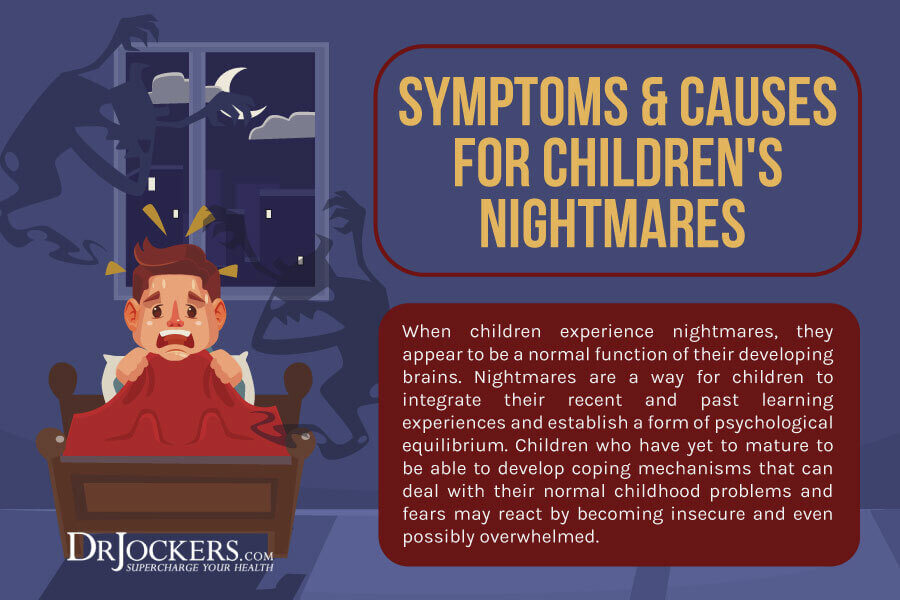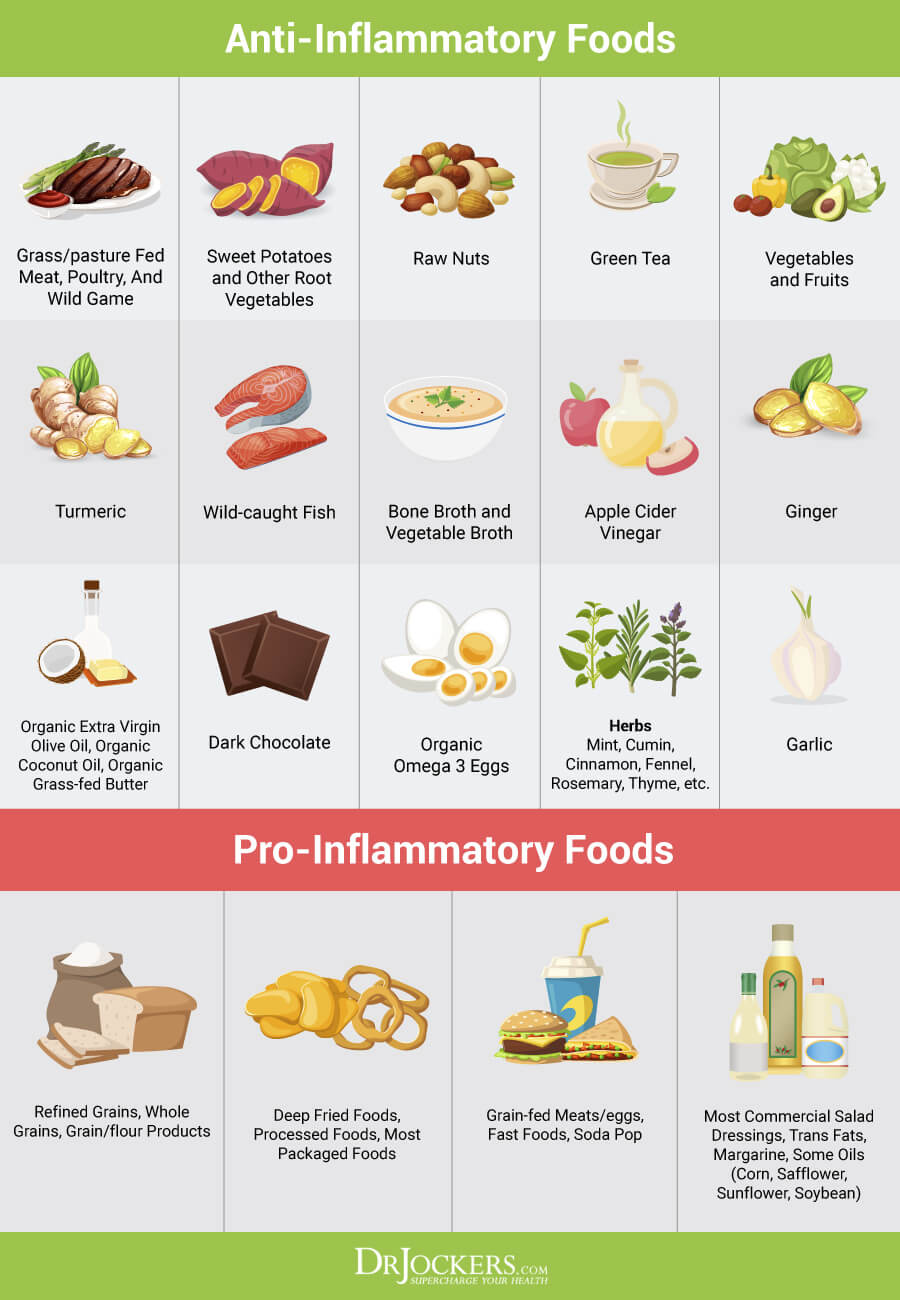Nightmares: 5 Main Causes and Natural Solutions
Nightmares are more than just bad dreams. They can be vividly realistic, upsetting, disturbing, and seriously distressing. If you are experiencing recurring or regular nightmares, it can have a detrimental impact on your sleep quality, energy levels, mental and physical health, and overall well-being. The good news is that there are natural solutions for nightmares that help you to improve your sleep and the quality of your life.
Int this article, you will learn what nightmares are and their main causes. I will share with you some simple natural solutions to reduce and eliminate nightmares and regain your well-being.
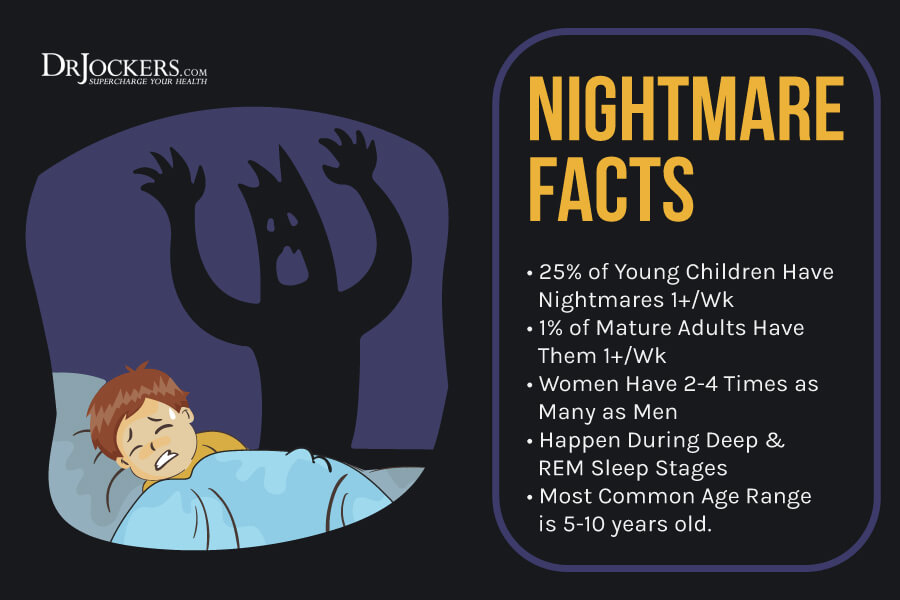
What Are Nightmares
Simply put, nightmares are very intense bad dreams. Some bad dreams are simply unpleasant or mildly disturbing, while nightmares may be more distressing, vividly realistic, upsetting, or disturbing that often wake you up from deep sleep.
It is a normal part of the brain development of a child to experience occasional nightmares. It is estimated that 25% of young children have at least 1 nightmare per week and the most common age is between 5-10 years old. While occasional nightmares are a normal part of brain maturation, if your child is experiencing these week after week there are things you can do that I will discuss further in this article to help reduce the nightmares.
Nightmares in Adults
Over 50 percent of adults have occasional nightmares but these are rare. It is estimated that only 1% of mature adults have nightmares at least one time per week. When nightmares become more frequent and reoccurring that may seriously affect your sleep, day-time energy levels, mood, and overall health (1).
You may experience fear or a pounding heart. The subject of nightmares may depend on nightmare to nightmare of person or person. More common ones may including falling from someone, trying to escape danger, or experiencing another scary situation (2, 3).
When we are talking about recurring nightmares, it’s important to understand that they may not be the exact same nightmare each night. However, they may follow similar themes or tropes while they may differ in content. You may wake up feeling the same emotions, including anger, anxiety, sadness, or guilt. If these feelings or thoughts associated with the nightmares are too disturbing, it may be difficult to fall back asleep (2, 3).
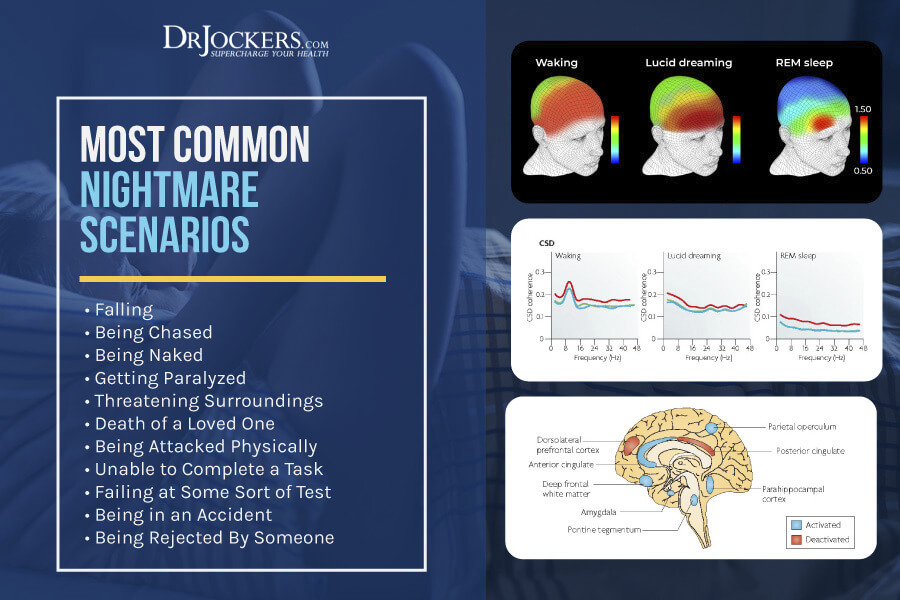
When Do Nightmares Occur:
Nightmares generally occur during your rapid eye movement (REM) sleep. This is the time that you normally experience dreaming. Your REM sleep periods turn longer as the night and your sleep progress, which explains why you may experience vivid dreams or nightmares more often during the early morning (4).
Besides nightmares, you may also experience night terrors. Night terrors generally happen during non-REM sleep, during the first few hours of your sleep instead of in the morning or the middle of the night. They are not dreams but are characterized by feelings, extreme agitation, screaming, or even sleepwalking, and waking up terrified without recalling the cause of your distress (4).
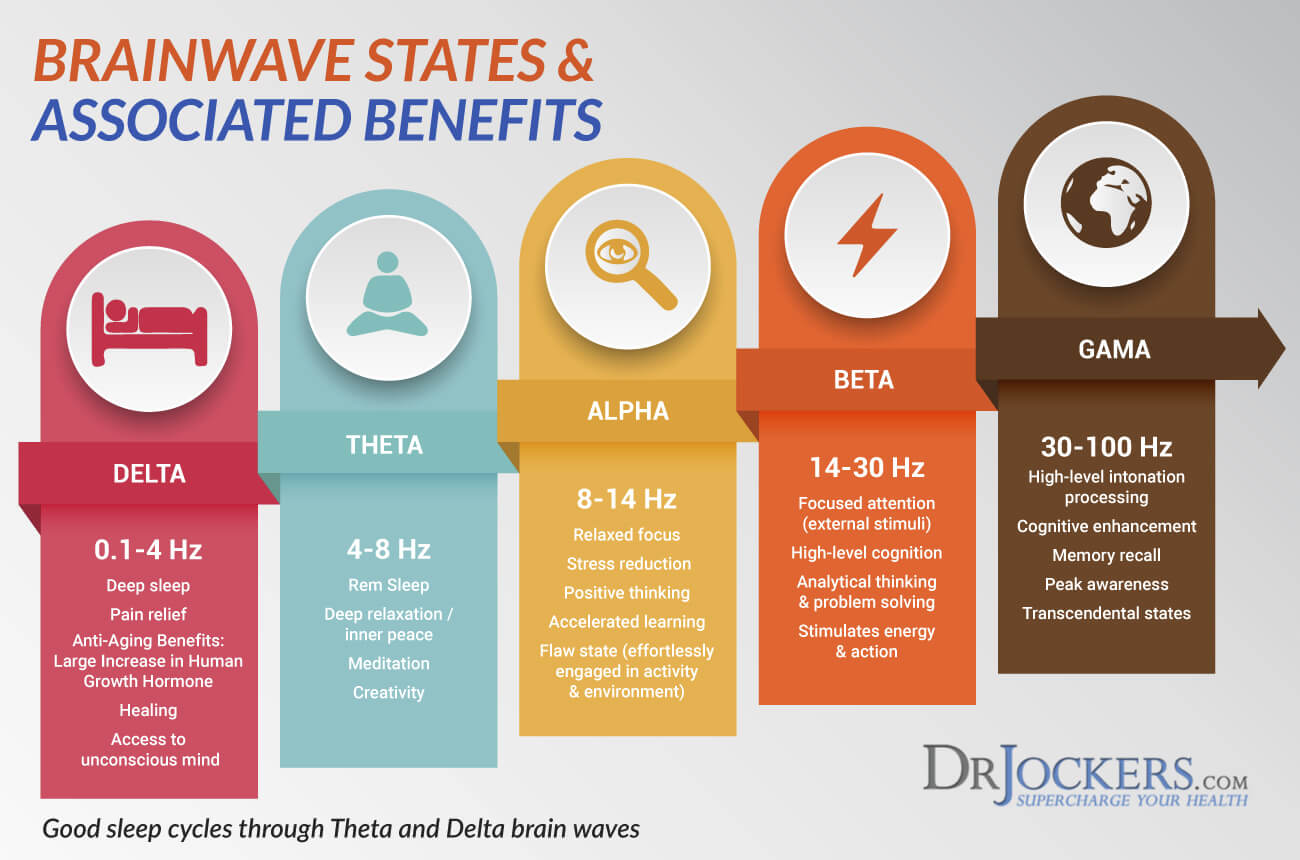
Main Causes of Nightmares
Experiencing a nightmare once in a blue moon is nothing to be worried about. Having recurring or regular nightmares, however, can seriously disrupt your sleep, energy levels, mental health, and physical well-being.
Recurring or regular nightmares may have a variety of underlying causes. It is important to understand the underlying cause of your nightmares to find some natural solutions and start enjoying goodnight sleeps without nightmares again. Let’s look at some of the main causes of nightmares.
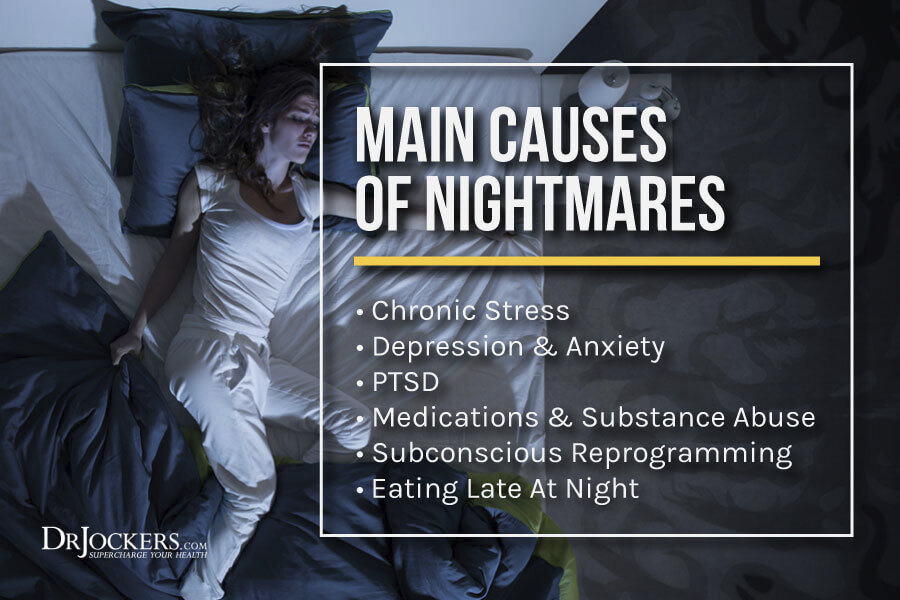
Chronic Stress and Nightmares
Chronic stress can be detrimental to your overall health. It may result in insomnia, difficulty falling or staying asleep. It may also lead to hyperarousal that may disrupt the healthy balance between your sleep and wakefulness.
When you are stressed, you are more likely to think about your problems before bedtime, fall asleep in a stressful sleep, and experience stressful disrupted sleep and nightmares (5).
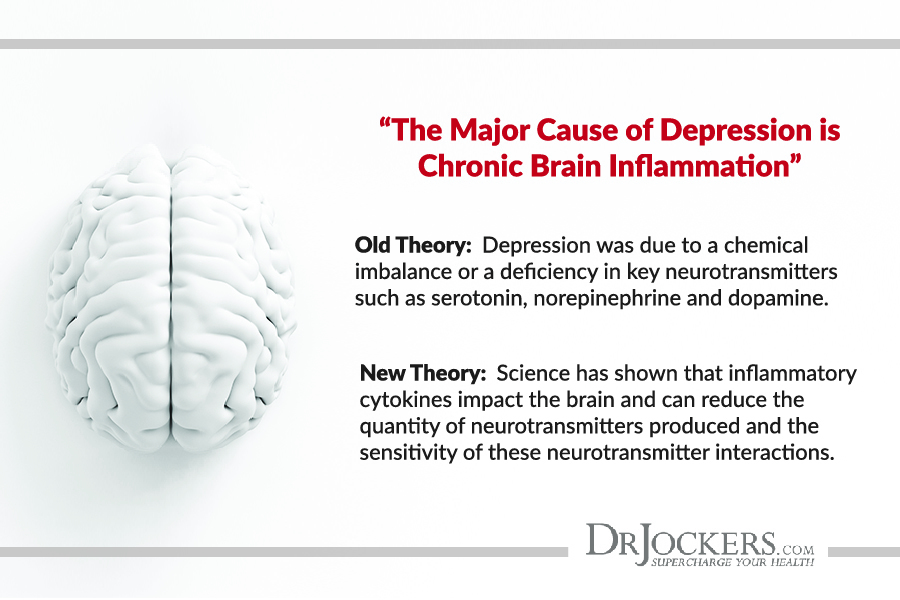
Depression & Anxiety
Depression and anxiety are among the main causes of nightmares. Research suggests that about one-third of people with nightmare also experience depression. Experiencing on-going emotional stress, depression, or anxiety, you may continue to experience similar symptoms in your dreams resulting in nightmares. People with depression and anxiety may also be more distressed by bad dreams and nightmares, resulting in increased depression, anxiety, and even suicide (6, 7).
If you have depression or anxiety, it is important that you seek professional support. With the help of nutritional solutions, lifestyle strategies, and therapy, you can feel happy and calm again. To learn more about how to be depression naturally, I recommend this article.
To learn more about anxiety and what foods may trigger anxiety, read this article.

PTSD and Nightmares
Experiencing or witnessing disturbing events and trauma may result in post-traumatic stress disorder (PTSD). PTSD affects about 7.7 million American adults due to a variety of traumatic experiences. Feeling high anxiety, fear, depression, frequent flashbacks, and nightmares are common symptoms of PTSD.
In fact, up to 96 percent of those with PTSD experience bad dreams, nightmares, or night terrors. If you suspect that you have PTSD, it is important to seek professional help to regain your quality of life.
Imagery rehearsal therapy and cognitive-behavioral therapy (CBT) have shown success with PTSD symptoms, including nightmares. I also recommend that you try some natural solutions that you will learn about later in this article (8, 9, 10, 11, 12).
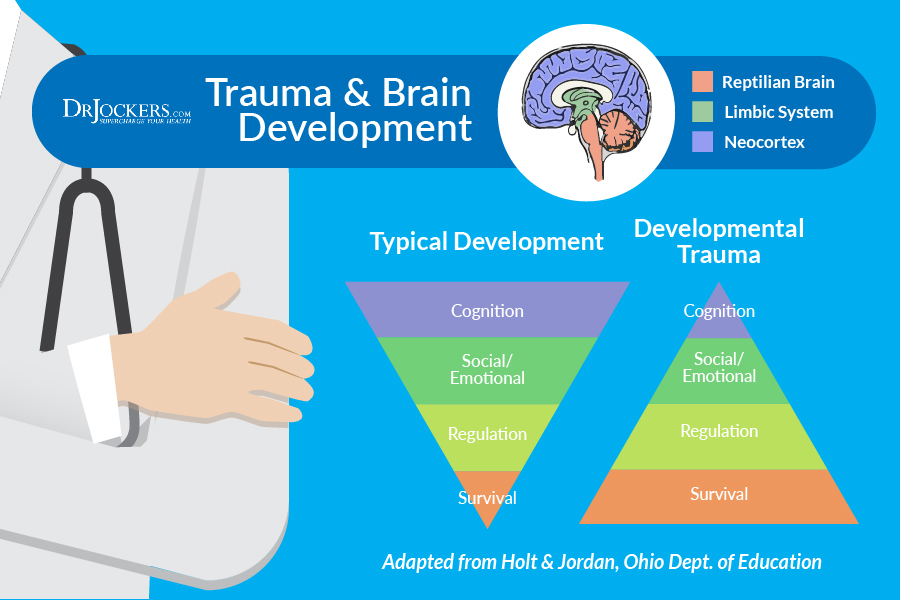
Medications & Substance Abuse
Prescription medications that are designed to affect your brain chemicals, such as antidepressants, may cause nightmares. Other prescription medications, such as medication for blood pressure issues, may also result in nightmares.
If you are taking any prescription medications and experiencing nightmares, it is important that you’ve spoken with your doctor. Together, you can weigh the pros and cons of taking this medication or see if you can take a different medication or better yet, improve your health through dietary and lifestyle changes (13).
Substance abuse of prescription medication, illegal drugs, and alcohol may also interfere with your sleep and cause nightmares because they contain chemicals that affect your brain.
Alcohol may interfere with your REM-sleep. Nightmares may be associated with depression, anxiety, or other underlying mental health or emotional issues of substance abuse or addiction.
Nightmares may also occur during the withdrawal and early recovery stages of substance abuse. If you are struggling with substance abuse or addictions, it is important that you seek professional help to recover (14, 15, 16).
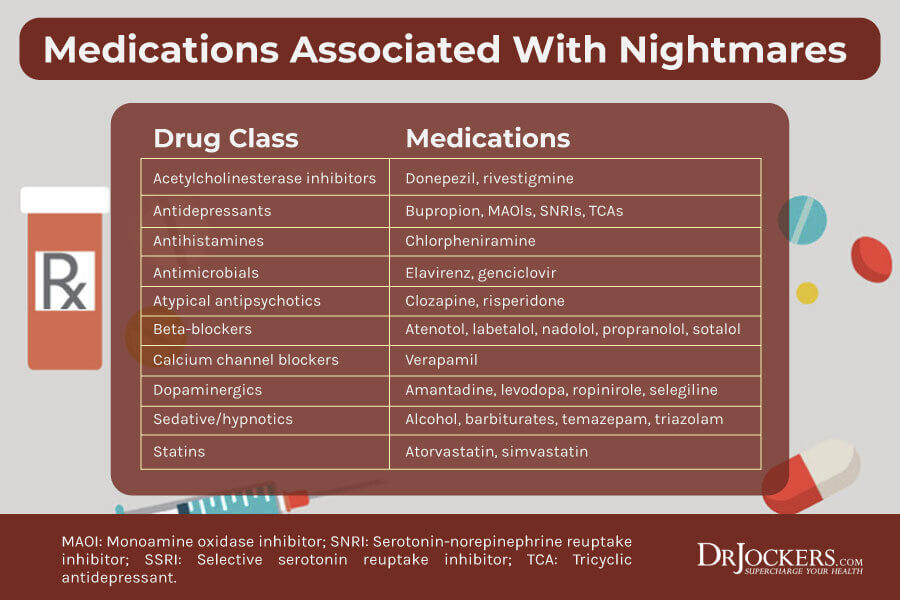
Subconscious Reprograming
Sigmund Freud discussed the importance of our unconscious mind and how dreams may provide access to them. Other psychoanalysts, psychologists, and professionals still believe that dreams and nightmares come from the unconscious mind.
Nightmares may represent our fears or other issues in life. In your nightmares, your subconscious may be trying to play out some of your biggest insecurities through the dream world.
Nightmares may hold a message and may show you what areas of your life you need to pay more attention to or insecurities or fears you may need to face. It may be beneficial to look at the themes, stories, and emotions in your nightmares to discover the solutions you are looking for (17).
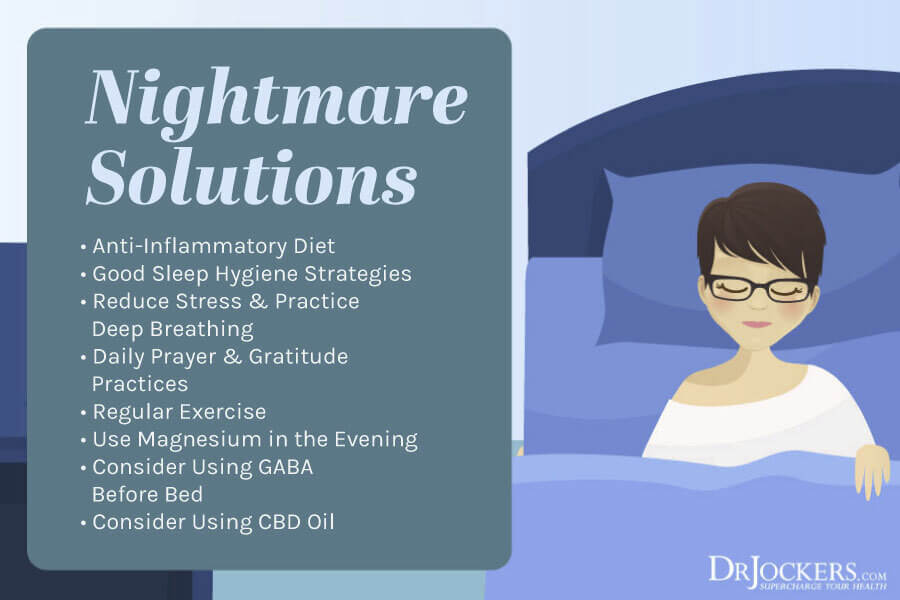
Natural Solutions For Nightmares
You don’t have to experience nightmares that are disrupting your sleep, energy levels, and well-being. There are some natural solutions you can turn to in order to stop your nightmare once and for all. Let’s look at them one by one.
Anti-Inflammatory Diet
Inflammation can lead to physical and emotional stress on your body and an array of health problems. Its consequences may even lead to nightmares. Eating inflammatory foods, such as sugar, may actually increase your risk of sleep troubles and nightmares. Anti-inflammatory foods, on the other hand, reduce inflammation and may help to calm your mind before sleep.
Eliminate refined sugars, refined oils, unhealthy fats, processed foods, junk foods, artificial ingredients, and toxins. Eat plenty of nutrient-dense, anti-inflammatory foods, including leafy greens, such as kale and spinach, non-starchy vegetables, such as cucumber and celery, herbs and spices, such as turmeric and rosemary, low-glycemic index fruits, such as berries and lemon, healthy fats, such as avocados and coconut oil, clean protein, such as organic grass-fed beef, pasture-raised poultry, wild-caught fish, wild game, and free-range eggs, nuts and seeds for fiber, and fermented foods, such as sauerkraut, and kefir for gut health. To learn more about how to eat an anti-inflammatory diet, read this article.
Good Sleep Hygiene Strategies
To reduce or eliminate nightmares, it is important that you support your sleep. If you go to bed stressed and set yourself up for only 5 hours of sleep or less, you may increase the risk of poor sleep and nightmares.
Make sure to go to bed every night and wake up every morning at the same time to support your circadian rhythms. Develop a bedtime routine that works for you. Practice journaling, meditation, and deep breathing exercises. Avoid caffeine and sugar, especially in the afternoon or evening. Create a stress-free sanctuary in your bedroom. Turn off electronics close to bedtime. Invest in a supportive bed with comfortable pillows and bedding.
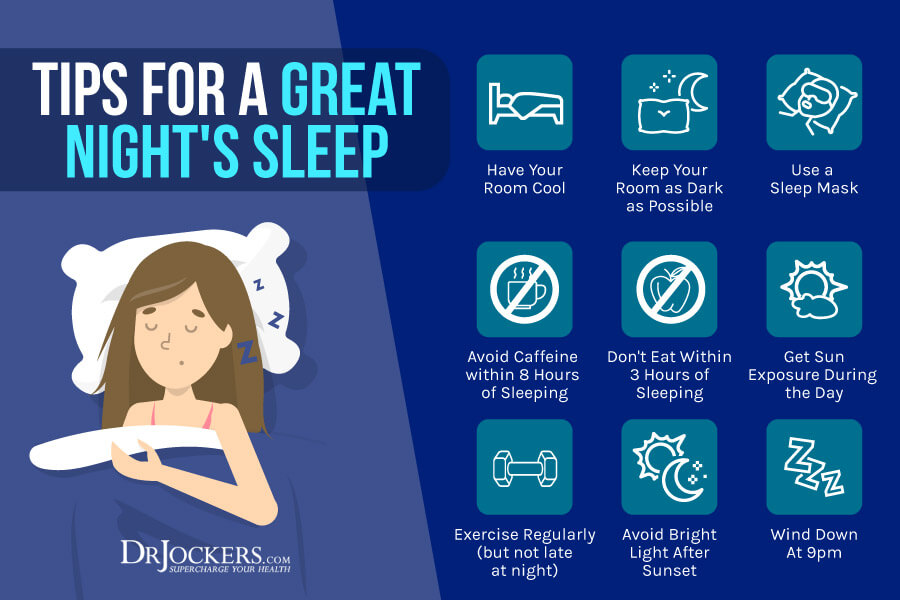
Reduce Stress and Practice Deep Breathing
In order to eliminate your nightmares, it is important that you reduce stress in your life. Avoid stress as much as possible and learn to respond to stress better. Practice diaphragmatic breathing regularly. It may help to lower anxiety, slow your heart rate, and decrease your blood pressure resulting in a calmer mind.
Meditation, yoga, and relaxation exercises are also fantastic for reducing stress. Journaling is a great way to let negative emotions out, reframe your thoughts, and lower stress, anxiety, and depression. You may keep a dream journal or discuss your dreams with a partner, friend, or therapist. Rewriting your dream may help to rewire neuropathways, calm your mind, and reduce nightmares.
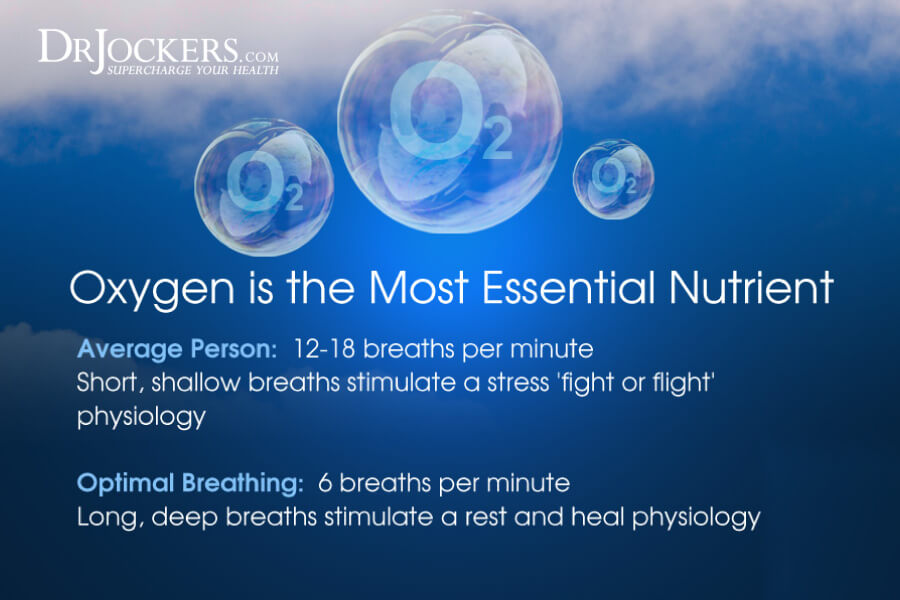
Daily Prayer and Gratitude Practices
Going to bed angry, upset, or sad may set you up for bad dreams and nightmares. It is very important that you lower your stress levels throughout the day and especially keep your last few hours stress-free, calm, and positive.
Having a gratitude practice is one of the best ways to shift your mood. When you are in a state of gratitude, you can’t experience negative emotions at the same time. Have a gratitude journal and jot down 3 to 5 things you are grateful for each night.
While it’s important to feel grateful for your friends and family, the roof over your head, and food on the table, it is best to look for new and specific things each day instead of only focusing on the generals. Practice an attitude of gratitude throughout the day.
Daily prayer or other spiritual practices are also a fantastic way to calm your mind, feel loved and supported, experience closeness to a higher power and nature, and have better and calmer dreams as a result.
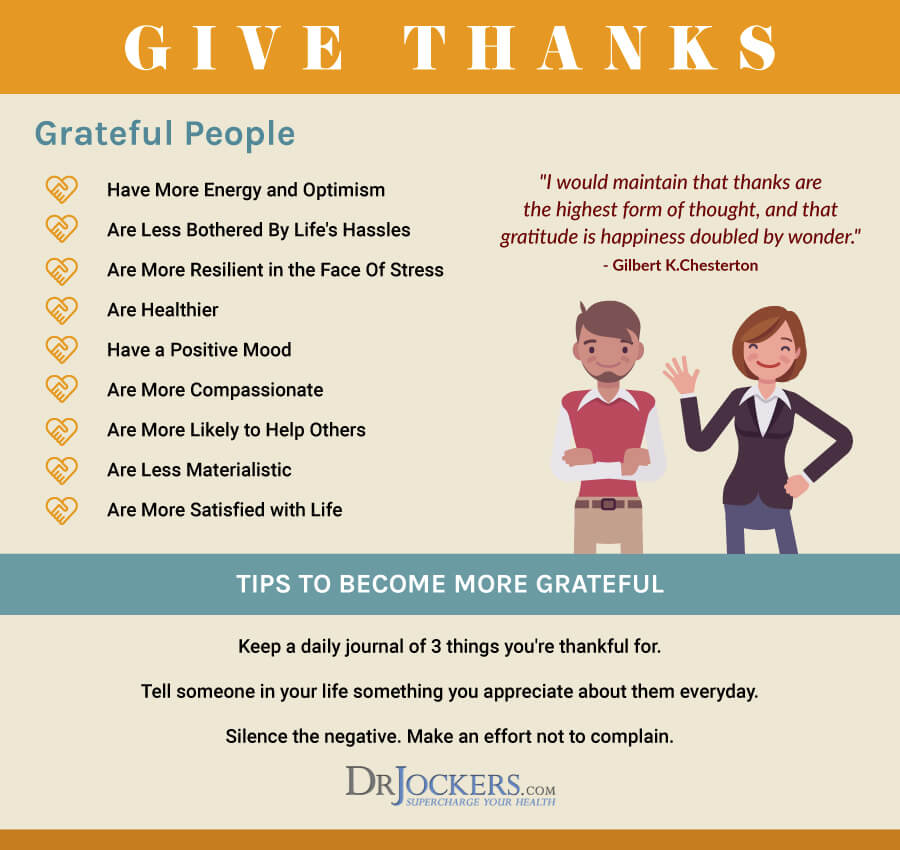
Regular Exercise
Regular exercise is incredibly important for your emotional and physical well-being. It may reduce stress, anxiety, and depression, and consequently, it may reduce nightmares as well.
Make sure to exercise at least five days a week 20 to 30 minutes a day. Try to stay active and move your body regularly every day. Get up at stretch regularly. Go for a nature walk or do a few yoga asanas.
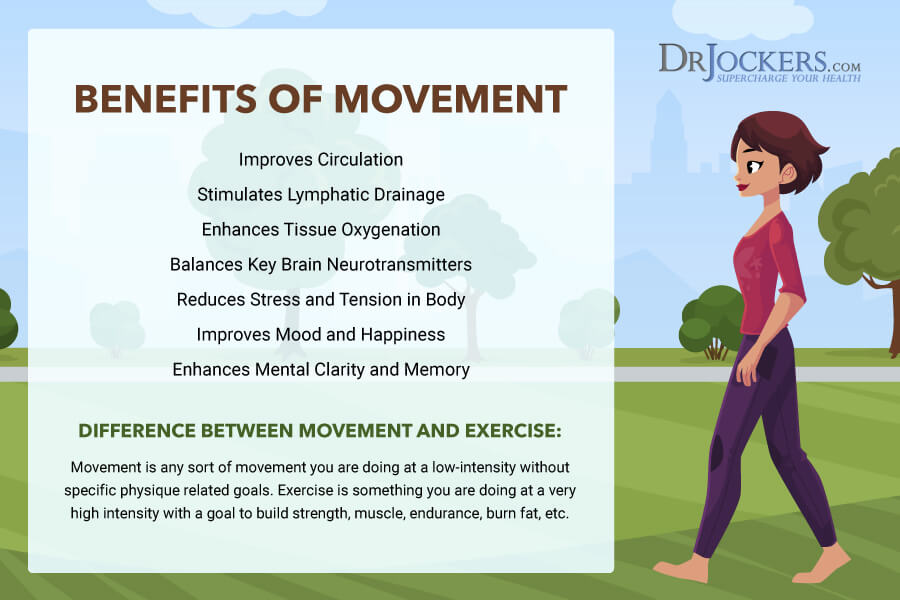
Use Magnesium in the Evening
Magnesium deficiency may trigger anxiety or depression that may result in nightmares. Taking magnesium, on the other hand, may help to relax your body and mind and help your sleep better.
I recommend Brain Calm Magnesium, that is designed specifically to calm your blood sugar, relax your muscles, balance your blood sugar, improve your sleep, and protect your brain.

Consider Using GABA Before Bed
Inhibitory neurotransmitter GABA imbalance may trigger anxiety and result in nightmares. I recommend GABA Calm before bed. It supports your body’s ability to fall asleep.
It may help to balance your mood, combat stress, reduce anxiety, agitation, and depression. Chew two tablets before going to sleep in order to reduce nightmares (18, 19, 20, 21).
Consider Using CBD For Relief
CBD oil, a non-psychoactive cannabinoid found in cannabis with a number of health benefits. Using CBD oil may reduce symptoms of anxiety, depression, and PTSD. It may also help to calm your mind, body, and help you sleep better.
To learn more about the benefits of CBD oil, I recommend this article. To reduce nightmares with the help of CBD oil, I recommend Rooted Apothecary.
They have high-quality CBD oil supplements, including capsules, tinctures, rollers, and body butter to ensure that you find the best support you are looking for. If you use the coupon code DrJockers you can get a 10% discount on your product purchases (22, 23, 24, 25, 26).
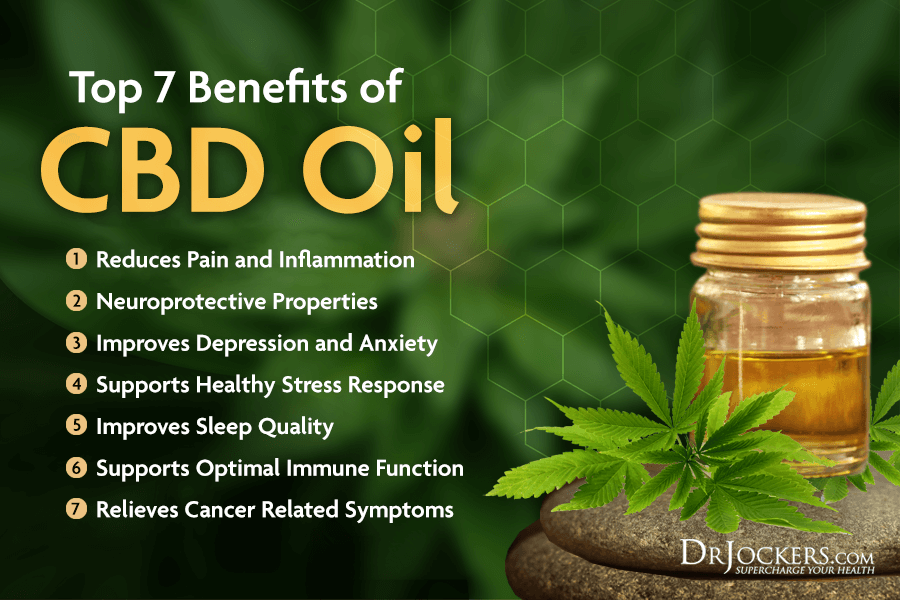
Final Thoughts on Nightmares
Nightmares can be vividly realistic, upsetting, disturbing, and seriously distressing. If you are experiencing recurring or regular nightmares, they can have a serious impact on your sleep quality, energy levels, mental and physical health, and overall well-being.
Try these natural solutions to reduce nightmares, experience good sleep, regain your energy, and better your health and well-being. If you are doing these thing and still struggling with nightmares, then I would recommend working with a functional health coach who can help you identify the root causes and customize a specific plan to get well. My health coaching team is well trained to help you achieve your health goals.

